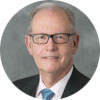Download PDF

Hydroxychloroquine, ivermectin, doxycycline, azithromycin, brilacidin, remdesivir, favipiravir, ritonavir, amlodipine, losartan, convalescent plasma, famotidine, dexamethasone, REGN-COV2. These are just a few of the drugs that have been investigated as possible treatments for COVID-19. Very few of us can keep up with the literature. The doubling time for medical information is now under two years. Some say under one year.
Keeping up with important discoveries is made even more difficult by the predatory publishing of some of the new generation of online “journals.” These online publications, unlike the high quality, peer-reviewed open access journals such as the Academy’s new Ophthalmology Science and ARVO’s Journal of Vision, are sometimes just “pay to publish” and loosely reviewed at best.
I went to the last two weeks’ “Junk” in my email and recovered invitations from 10 different unknown journals asking me to submit papers. Such emails are “personally” addressed variously to “Dear DW David,” “Dear Esteemed ParkeII,” and “Most Impressive Doctor David.” Many of you receive more of these than I do.
One says that it “accepts all kinds of write-ups and if no new article available [sic] to publish, you can also submit commentaries, book reviews, letter to editor, short communication, opinion articles, etc., based on your research interest or on based on [sic] your published articles within the scope of the journal.”
All of this just compounds the problem for physicians, scientists, public health officials, and policy wonks as they try to keep up with the rapid evolution of legitimate scientific literature and with distinguishing valuable science from less rigorous papers and presentations.
In the setting of urgent threats to public health, large randomized clinical trials are needed more than ever. However, they are increasingly challenging to design and to perform as the standard of care evolves and variable administration of confounding medications (hydroxychloroquine and dexamethasone, for example) threaten analytic integrity.
Consider the problem with convalescent plasma—a treatment approach (passive immunotherapy) that has been used for more than 100 years. The earliest randomized trials in COVID-19 were inconclusive due to factors including underenrollment and varying study design. This didn’t stop the lay (and the medical) press from popularizing its use. Subsequent observational studies seemed to confirm safety but didn’t provide definitive proof of efficacy, dosing, and patient selection. As recently as late fall, members of an NIH guidelines panel concluded that they could not recommend for or against its use. (A more recent randomized trial supports specific use recommendations.) Recommendations for other therapies such as remdesivir have evolved literally month by month.
It is much easier to identify what’s “new” than what will be enduringly “true” scientifically and clinically. And the challenge is never more significant than during a time of public health emergency when the stakes are high for physician and patient. How do we keep up when social distancing eliminates many of the most efficient and popular means of continuing education—meetings and networking?
Many of us are driven by the need to master the current literature relevant to our discipline. However, the combination of too great a volume of information, of proliferating sources of scientific information, of a huge range in quality and reliability of the information, and of disrupted means of continuing education is unsettling and has disturbing clinical implications.
This places an additional onus on the more than 400 volunteer ophthalmologists of the Academy’s Education Division. It is their responsibility to digest the literature, help determine “just new” from “new and probably true,” distill its essence for clinician consumption, and promulgate it. It’s a high calling and responsibility. During times like this, we are all indebted to them.